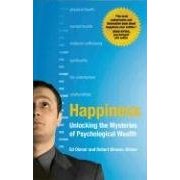“Dr. Happiness” is regarded as the world’s leading psychological researcher of human happiness. He’s also been called the “Jedi Master of Happiness.” His real name is Ed Diener, and he’s a professor at the University of Illinois. I said a little more about him when I talked about his Life Satisfaction Scale.
He’s written a book for the general public together with his son, Robert Biswas-Diener, a psychologist known for his ability to collect hard-to-get data. He studies subjective well-being in far flung places like Greenland, India, Israel, Spain, and Kenya, working with remote groups of people traditionally overlooked by researchers. Because of this he’s also acquired a nickname, the “Indiana Jones of positive psychology.”
Their book came out just a few days ago, but it’s already gotten quite a bit of attention, including reviews. There’s even one on Oprah.com.
It’s called Happiness: Unlocking the Mysteries of Psychological Wealth. Psychological wealth is “your true net worth, and includes your attitudes toward life, social support, spiritual development, material resources, health, and the activities in which you engage.”
The book is being widely praised:
“This is the most authoritative and informative book about happiness ever written. That’s not surprising, given that its authors are the world’s leading happiness researcher and his psychologist-son, whose vocation is coaching people toward happier lives.” -David G. Myers, Hope College, author, The Pursuit of Happiness: Discovering the Pathway to Fulfillment, Well-Being, and Enduring Personal Joy
“A great gift from the leading professional scientist of happiness in the world and his son, the ‘Indiana Jones’ of positive psychology.” -Martin E. P. Seligman, University of Pennsylvania and author, Authentic Happiness
“Want the key to happiness and success in life, choose the right advisor. On the subject of happiness, students, researchers, businesses, and governments have been turning to Ed Diener. Now, in this powerful, ground-breaking book, we have the opportunity to receive the coveted advice of Dr. Diener and his son Robert Biswas-Diener. This book is a must read if you want a practical, enjoyable, and uplifting science-based guide to achieving real psychological wealth.” -David J. Pollay, President, The Momentum Project, Syndicated Columnist
“The collaboration between the foremost authority on happiness research and the “Indiana Jones” of psychology makes for a great mix of interesting examples and solid research. I have never seen a book that does such a good job offering useful practical advice while basing this advice on completely sound empirical research.” -Richard E. Lucas, Michigan State University
“This is a happiness book by the world authority, the pre-eminent scholar in the field along with an in-the-trenches coach who teaches and adapts this material every day for practical use with his clients. These folks know happiness from the inside out. The authors separate the wheat from the chaff, and serve up a meal replete with tasty morsels of practical advice on how to live. A joy to read!” -Michael B. Frisch, Baylor University, author, Quality of Life Therapy
In the phone interview I mentioned in my last post (where I mostly talked about professor Sonja Lyubomirsky’s book on happiness), Ed Diener talked about some of the same things that are in his book.
True or False:
1. I’d be happier if I made more money, found the perfect mate, lost 10 pounds, or moved to a new house.
2. Happiness is genetic. You can’t change how happy you are any more than you can change how tall you are.
3. Success brings happiness.
Well, it’s clear that environmental factors can have an affect on how tall you are. (Have our genes suddenly become almost 10% different from our – shorter – grandparents’ generation?) And there is a genetic component to happiness. Also, money can make some difference, especially at levels of poverty where basic needs aren’t met. But for the rest of us money doesn’t have nearly the impact that people seem to assume. And reaching the other goals where you get something turns out not to make us anywhere as happy as we expect.
Basically, all 3 are false.
So what does make a real difference?
First and foremost seems to be relationships. Close, supportive social relationships. We need people who we care about.
Second is attitudinal: being grateful, attending to good things/experiences and savoring them (vs. ruminating on the negative). Positive attitudes toward life in general.
Happiness is a process, not a destination.
Here’s the book: Happiness: Unlocking the Mysteries of Psychological Wealth. I’ll be talking more about its contents in the future.
![[Circle]](http://www.meaningandhappiness.com/pictures/GoldCircle36i.png)


